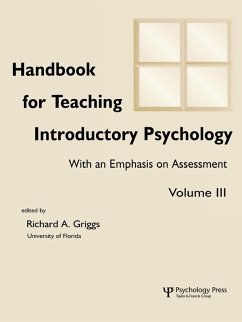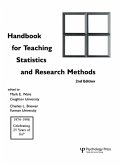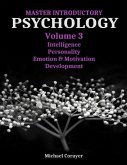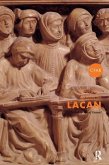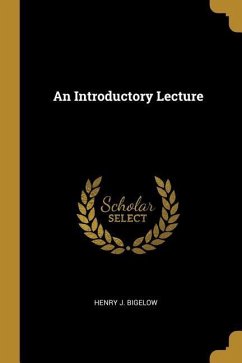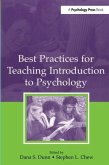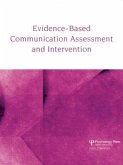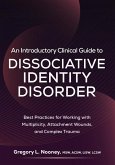Handbook for Teaching Introductory Psychology
Volume Ii
Herausgeber: Hebl, Michelle Rae; Benjamin Jr., Ludy T.; Brewer, Charles L.
Handbook for Teaching Introductory Psychology
Volume Ii
Herausgeber: Hebl, Michelle Rae; Benjamin Jr., Ludy T.; Brewer, Charles L.
- Broschiertes Buch
- Merkliste
- Auf die Merkliste
- Bewerten Bewerten
- Teilen
- Produkt teilen
- Produkterinnerung
- Produkterinnerung
Like its predecessors, Volume III of the Handbook for Teaching Introductory Psychology provides introductory psychology instructors with teaching ideas and activities that can immediately be put into practice in the classroom. It contains an organized collection of articles from Teaching of Psychology (TOP), the official journal of the Society for the Teaching of Psychology, Division 2 of the American Psychological Association. Volume III contains 89 articles from TOP that have not been included in other volumes. Another distinction between this volume and its predecessors is its emphasis on…mehr
Andere Kunden interessierten sich auch für
![Handbook for Teaching Statistics and Research Methods Handbook for Teaching Statistics and Research Methods]() Handbook for Teaching Statistics and Research Methods68,99 €
Handbook for Teaching Statistics and Research Methods68,99 €![Master Introductory Psychology Volume 3 Master Introductory Psychology Volume 3]() Michael CorayerMaster Introductory Psychology Volume 310,99 €
Michael CorayerMaster Introductory Psychology Volume 310,99 €![Introductory Lectures on Lacan Introductory Lectures on Lacan]() Astrid GessertIntroductory Lectures on Lacan22,99 €
Astrid GessertIntroductory Lectures on Lacan22,99 €![An Introductory Lecture An Introductory Lecture]() Henry J BigelowAn Introductory Lecture15,99 €
Henry J BigelowAn Introductory Lecture15,99 €![Best Practices for Teaching Introduction to Psychology Best Practices for Teaching Introduction to Psychology]() Best Practices for Teaching Introduction to Psychology59,99 €
Best Practices for Teaching Introduction to Psychology59,99 €![Teaching Evidence-Based Practice Teaching Evidence-Based Practice]() Teaching Evidence-Based Practice40,99 €
Teaching Evidence-Based Practice40,99 €![An Introductory Clinical Guide to Dissociative Identity Disorder An Introductory Clinical Guide to Dissociative Identity Disorder]() Gregory NooneyAn Introductory Clinical Guide to Dissociative Identity Disorder18,99 €
Gregory NooneyAn Introductory Clinical Guide to Dissociative Identity Disorder18,99 €-
-
-
Like its predecessors, Volume III of the Handbook for Teaching Introductory Psychology provides introductory psychology instructors with teaching ideas and activities that can immediately be put into practice in the classroom. It contains an organized collection of articles from Teaching of Psychology (TOP), the official journal of the Society for the Teaching of Psychology, Division 2 of the American Psychological Association. Volume III contains 89 articles from TOP that have not been included in other volumes. Another distinction between this volume and its predecessors is its emphasis on testing and assessment. The book is divided into two sections. Section One, "Issues and Approaches in Teaching Introductory Psychology," contains 52 articles on critical issues, such as: how to approach the course; understanding students' interests, perceptions, and motives; students' existing knowledge of psychology (including their misconceptions); a comparison of introductory textbooks and tips on how to evaluate them; test questions and student factors affecting exam performance; an overview of different forms of feedback; giving extra credit; and how to deal with academic dishonesty. Section Two consists of 37 articles that present demonstrations, class and laboratory projects, and other techniques to enhance teaching and learning in both the introductory, as well as advanced courses in the discipline. This section is organized so as to parallel the order of topics found in most introductory psychology textbooks. Intended for academicians who teach the introductory psychology course and/or oversee grad assistants who teach the course, all royalties of the book go directly to the Society for the Teaching of Psychology to promote its activities to further improve the teaching of psychology.
Produktdetails
- Produktdetails
- Verlag: Psychology Press
- Seitenzahl: 272
- Erscheinungstermin: 1. August 2001
- Englisch
- Abmessung: 280mm x 210mm x 15mm
- Gewicht: 673g
- ISBN-13: 9780805839210
- ISBN-10: 0805839216
- Artikelnr.: 21009716
- Herstellerkennzeichnung
- Libri GmbH
- Europaallee 1
- 36244 Bad Hersfeld
- gpsr@libri.de
- Verlag: Psychology Press
- Seitenzahl: 272
- Erscheinungstermin: 1. August 2001
- Englisch
- Abmessung: 280mm x 210mm x 15mm
- Gewicht: 673g
- ISBN-13: 9780805839210
- ISBN-10: 0805839216
- Artikelnr.: 21009716
- Herstellerkennzeichnung
- Libri GmbH
- Europaallee 1
- 36244 Bad Hersfeld
- gpsr@libri.de
Michelle Rae Hebl, Charles L. Brewer, Jr. Benjamin, Ludy T.
Contents: Preface. Section I: Issues and Approaches in Teaching Introductory Psychology.Part I: Approaches to the Introductory Course.D. McAdam
Bringing Psychology to Life. D.C. Appleby
Using Psychology Today Articles to Increase the Perceived Relevance of the Introductory Course. N.B.L. Ferguson
Encouraging Responsibility
Active Participation
and Critical Thinking in General Psychology Students. S.W. VanderStoep
A. Fagerlin
J.S. Feenstra
What Do Students Remember From Introductory Psychology? Part II: Students' Interests
Perceptions
and Motives.B. Perlman
L.I. McCann
Student Perspectives on the First Day of Class. A.H. Becker
S.K. Calhoon
What Introductory Psychology Students Attend to on a Course Syllabus. B. Perlman
L.I. McCann
Students' Pet Peeves About Teaching. R.G. Laffitte
Jr.
Effects of Topic Order in Introductory Psychology on Student Achievement
Interest
and Perceived Course Difficulty. W.S. Messer
R.A. Griggs
Student Belief and Involvement in the Paranormal and Performance in Introductory Psychology. W. Weiten
D. Deguara
E. Rehmke
L. Sewall
University
Community College
and High School Students' Evaluations of Textbook Pedagogical Aids. Part III: Students' Knowledge About Psychology.R.A. Griggs
S.E. Ransdell
Misconceptions Tests or Misconceived Tests? H.C. Rickard
R. Rogers
N.R. Ellis
W.B. Beidleman
Some Retention
But Not Enough. M.A. Barnett
Commonsense and Research Findings in Personality. M.A. Barnett
J. Knust
T. McMillan
J. Kaufman
C. Sinisi
Research Findings in Developmental Psychology: Common Sense Revisited. P.A. Lamal
College Students' Misconceptions About Behavior Analysis. R.L. Miller
W.J. Wozniak
M.R. Rust
B.R. Miller
J. Slezak
Counterattitudinal Advocacy as a Means of Enhancing Instructional Effectiveness: How to Teach Students What They Do Not Want to Know. Part IV: Introductory Textbooks: Objective Features.R.A. Griggs
Introductory Psychology Textbooks: Assessing Levels of Difficulty. J.S. Zechmeister
E.B. Zechmeister
Introductory Textbooks and Psychology's Core Concepts. P. Marek
R.A. Griggs
A.N. Christopher
Pedagogical Aids in Textbooks: Do College Students' Perceptions Justify Their Prevalence? R.A. Griggs
S.L. Jackson
P. Marek
A.N. Christopher
Critical Thinking in Introductory Psychology Texts and Supplements. Part V: Introductory Textbooks: Problems.G. Windholz
P.A. Lamal
Kohler's Insight Revisited. R.A. Griggs
Who Is Mrs. Cantlie and Why Are They Doing Those Terrible Things to Her Homunculi? E.J. Letourneau
T.C. Lewis
The Portrayal of Child Sexual Assault in Introductory Psychology Textbooks. Part VI: Examinations: Questions.D.D. Kerkman
K.L. Kellison
M.F. Piñon
D. Schmidt
S. Lewis
The Quiz Game: Writing and Explaining Questions Improve Quiz Scores. P.W. Foos
Effects of Student-Written Questions on Student Test Performance. E.B. Gurman
W.B. Holliman
K. Camperell
Oral Application Questions as a Teaching Strategy. A.F. Nield
M.G. Wintre
Multiple-Choice Questions With an Option to Comment: Student Attitudes and Use. D.K. Dodd
L. Leal
Answer Justification: Removing the "Trick" From Multiple-Choice Questions. K.A. Wollen
R.L. Quackenbush
C.K. Hamlin
The Use of Literal and Applied Test Questions to Assess Understanding of Concepts. Part VII: Examinations: Test Factors Affecting Exam Performance. R.C. Sinclair
A.S. Soldat
M.M. Mark
Affective Cues and Processing Strategy: Color-Coded Examination Forms Influence Performance. W.R. Balch
Item Order Affects Performance on Multiple-Choice Exams. D.L. Neely
F.J. Springston
S.J.H. McCann
Does Item Order Affect Performance on Multiple-Choice Exams? C.A. Grover
A.H. Becker
S.F. Davis
Chapters and Units: Frequent Versus Infrequent Testing Revisited. Part VIII: Examinations: Student Factors Affecting Exam Performance.R.A. Griggs
S.L. Jackson
A Reexamination of the Relationship of High School Psychology and Natural Science Courses to Performance in a College Introductory Psychology Class. D.J. Woehr
T.A. Cavell
Self-Report Measures of Ability
Effort
and Nonacademic Activity as Predictors of Introductory Psychology Test Scores. H.P. Beck
S. Rorrer-Woody
L.G. Pierce
The Relations of Learning and Grade Orientations to Academic Performance. L. Baker
B.R. Lombardi
Students' Lecture Notes and Their Relation to Test Performance. Part IX: Examinations: Feedback.D.M. Carkenord
Assessing the Essay Feedback Technique of Providing an Example of a Full-Credit Answer. L.C. Light
W.J. McKeachie
Y-G. Lin
Self-Scoring: A Self-Monitoring Procedure. H. Friedman
Immediate Feedback
No Return Test Procedure for Introductory Courses. R.A. Smith
R. Wight
Student Evaluation of Friedman's Immediate Feedback
No Return Test Procedure for Introductory Psychology. W.E. Addison
Consequences of Missing Postexam Review Sessions. Part X: Extra Credit.J.C. Norcross
L.J. Horrocks
J.F. Stevenson
Of Barfights and Gadflies: Attitudes and Practices Concerning Extra Credit in College Courses. N. Oley
Extra Credit and Peer Tutoring: Impact on the Quality of Writing in Introductory Psychology in an Open Admissions College. G.W. Hill
IV
J.J. Palladino
J.A. Eison
Blood
Sweat
and Trivia: Faculty Ratings of Extra-Credit Opportunities. J.C. Norcross
H.S. Dooley
J.F. Stevenson
Faculty Use and Justification of Extra Credit: No Middle Ground? E.N. Junn
Empowering the Marginal Student: A Skills-Based Extra-Credit Assignment. Part XI: Academic Dishonesty.S.F. Davis
C.A. Grover
A.H. Becker
L.N. McGregor
Academic Dishonesty: Prevalence
Determinants
Techniques
and Punishments. S.F. Davis
H.W. Ludvigson
Additional Data on Academic Dishonesty and a Proposal for Remediation. F.S. Bellezza
S.F. Bellezza
Detection of Cheating on Multiple-Choice Tests by Using Error-Similarity Analysis. F.S. Bellezza
S.F. Bellezza
Detection of Copying on Multiple-Choice Tests: An Update. M.D. Caron
S.K. Whitbourne
R.P. Halgin
Fraudulent Excuse Making Among College Students. Section II: Demonstrations and Activities in Introductory Psychology.Part XII: General.J. Krauss
A Jigsaw Puzzle Approach to Learning History in Introductory Psychology. J.P. Sheldon
Student-Created Skits: Interactive Class Demonstrations. E.A. Rider
Understanding and Applying Psychology Through Use of News Clippings. T.J. Lawson
The Media Assignment: Enhancing Psychology Students' Ability to Apply Their Knowledge of Psychology. T.M. Osberg
Psychology is Not Just Common Sense: An Introductory Psychology Demonstration. H. Pennington
Excerpts From Journal Articles as Teaching Devices. Part XIII: Research Methods and Statistics.V.A. Kazmerski
D.G. Blasko
Teaching Observational Research in Introductory Psychology: Computerized and Lecture-Based Methods. M.J. Marshall
D.R. Linden
Simulating Clever Hans in the Classroom. B.C. Beins
Using the Barnum Effect to Teach About Ethics and Deception in Research. A. Kohn
Defying Intuition: Demonstrating the Importance of the Empirical Technique. J.A. Bates
Teaching Hypothesis Testing by Debunking a Demonstration of Telepathy. R.A. Ward
A.F. Grasha
Using Astrology to Teach Research Methods to Introductory Psychology Students. Part XIV: Biopsychology. E.R. Harcum
Reaction Time as a Behavioral Demonstr
Bringing Psychology to Life. D.C. Appleby
Using Psychology Today Articles to Increase the Perceived Relevance of the Introductory Course. N.B.L. Ferguson
Encouraging Responsibility
Active Participation
and Critical Thinking in General Psychology Students. S.W. VanderStoep
A. Fagerlin
J.S. Feenstra
What Do Students Remember From Introductory Psychology? Part II: Students' Interests
Perceptions
and Motives.B. Perlman
L.I. McCann
Student Perspectives on the First Day of Class. A.H. Becker
S.K. Calhoon
What Introductory Psychology Students Attend to on a Course Syllabus. B. Perlman
L.I. McCann
Students' Pet Peeves About Teaching. R.G. Laffitte
Jr.
Effects of Topic Order in Introductory Psychology on Student Achievement
Interest
and Perceived Course Difficulty. W.S. Messer
R.A. Griggs
Student Belief and Involvement in the Paranormal and Performance in Introductory Psychology. W. Weiten
D. Deguara
E. Rehmke
L. Sewall
University
Community College
and High School Students' Evaluations of Textbook Pedagogical Aids. Part III: Students' Knowledge About Psychology.R.A. Griggs
S.E. Ransdell
Misconceptions Tests or Misconceived Tests? H.C. Rickard
R. Rogers
N.R. Ellis
W.B. Beidleman
Some Retention
But Not Enough. M.A. Barnett
Commonsense and Research Findings in Personality. M.A. Barnett
J. Knust
T. McMillan
J. Kaufman
C. Sinisi
Research Findings in Developmental Psychology: Common Sense Revisited. P.A. Lamal
College Students' Misconceptions About Behavior Analysis. R.L. Miller
W.J. Wozniak
M.R. Rust
B.R. Miller
J. Slezak
Counterattitudinal Advocacy as a Means of Enhancing Instructional Effectiveness: How to Teach Students What They Do Not Want to Know. Part IV: Introductory Textbooks: Objective Features.R.A. Griggs
Introductory Psychology Textbooks: Assessing Levels of Difficulty. J.S. Zechmeister
E.B. Zechmeister
Introductory Textbooks and Psychology's Core Concepts. P. Marek
R.A. Griggs
A.N. Christopher
Pedagogical Aids in Textbooks: Do College Students' Perceptions Justify Their Prevalence? R.A. Griggs
S.L. Jackson
P. Marek
A.N. Christopher
Critical Thinking in Introductory Psychology Texts and Supplements. Part V: Introductory Textbooks: Problems.G. Windholz
P.A. Lamal
Kohler's Insight Revisited. R.A. Griggs
Who Is Mrs. Cantlie and Why Are They Doing Those Terrible Things to Her Homunculi? E.J. Letourneau
T.C. Lewis
The Portrayal of Child Sexual Assault in Introductory Psychology Textbooks. Part VI: Examinations: Questions.D.D. Kerkman
K.L. Kellison
M.F. Piñon
D. Schmidt
S. Lewis
The Quiz Game: Writing and Explaining Questions Improve Quiz Scores. P.W. Foos
Effects of Student-Written Questions on Student Test Performance. E.B. Gurman
W.B. Holliman
K. Camperell
Oral Application Questions as a Teaching Strategy. A.F. Nield
M.G. Wintre
Multiple-Choice Questions With an Option to Comment: Student Attitudes and Use. D.K. Dodd
L. Leal
Answer Justification: Removing the "Trick" From Multiple-Choice Questions. K.A. Wollen
R.L. Quackenbush
C.K. Hamlin
The Use of Literal and Applied Test Questions to Assess Understanding of Concepts. Part VII: Examinations: Test Factors Affecting Exam Performance. R.C. Sinclair
A.S. Soldat
M.M. Mark
Affective Cues and Processing Strategy: Color-Coded Examination Forms Influence Performance. W.R. Balch
Item Order Affects Performance on Multiple-Choice Exams. D.L. Neely
F.J. Springston
S.J.H. McCann
Does Item Order Affect Performance on Multiple-Choice Exams? C.A. Grover
A.H. Becker
S.F. Davis
Chapters and Units: Frequent Versus Infrequent Testing Revisited. Part VIII: Examinations: Student Factors Affecting Exam Performance.R.A. Griggs
S.L. Jackson
A Reexamination of the Relationship of High School Psychology and Natural Science Courses to Performance in a College Introductory Psychology Class. D.J. Woehr
T.A. Cavell
Self-Report Measures of Ability
Effort
and Nonacademic Activity as Predictors of Introductory Psychology Test Scores. H.P. Beck
S. Rorrer-Woody
L.G. Pierce
The Relations of Learning and Grade Orientations to Academic Performance. L. Baker
B.R. Lombardi
Students' Lecture Notes and Their Relation to Test Performance. Part IX: Examinations: Feedback.D.M. Carkenord
Assessing the Essay Feedback Technique of Providing an Example of a Full-Credit Answer. L.C. Light
W.J. McKeachie
Y-G. Lin
Self-Scoring: A Self-Monitoring Procedure. H. Friedman
Immediate Feedback
No Return Test Procedure for Introductory Courses. R.A. Smith
R. Wight
Student Evaluation of Friedman's Immediate Feedback
No Return Test Procedure for Introductory Psychology. W.E. Addison
Consequences of Missing Postexam Review Sessions. Part X: Extra Credit.J.C. Norcross
L.J. Horrocks
J.F. Stevenson
Of Barfights and Gadflies: Attitudes and Practices Concerning Extra Credit in College Courses. N. Oley
Extra Credit and Peer Tutoring: Impact on the Quality of Writing in Introductory Psychology in an Open Admissions College. G.W. Hill
IV
J.J. Palladino
J.A. Eison
Blood
Sweat
and Trivia: Faculty Ratings of Extra-Credit Opportunities. J.C. Norcross
H.S. Dooley
J.F. Stevenson
Faculty Use and Justification of Extra Credit: No Middle Ground? E.N. Junn
Empowering the Marginal Student: A Skills-Based Extra-Credit Assignment. Part XI: Academic Dishonesty.S.F. Davis
C.A. Grover
A.H. Becker
L.N. McGregor
Academic Dishonesty: Prevalence
Determinants
Techniques
and Punishments. S.F. Davis
H.W. Ludvigson
Additional Data on Academic Dishonesty and a Proposal for Remediation. F.S. Bellezza
S.F. Bellezza
Detection of Cheating on Multiple-Choice Tests by Using Error-Similarity Analysis. F.S. Bellezza
S.F. Bellezza
Detection of Copying on Multiple-Choice Tests: An Update. M.D. Caron
S.K. Whitbourne
R.P. Halgin
Fraudulent Excuse Making Among College Students. Section II: Demonstrations and Activities in Introductory Psychology.Part XII: General.J. Krauss
A Jigsaw Puzzle Approach to Learning History in Introductory Psychology. J.P. Sheldon
Student-Created Skits: Interactive Class Demonstrations. E.A. Rider
Understanding and Applying Psychology Through Use of News Clippings. T.J. Lawson
The Media Assignment: Enhancing Psychology Students' Ability to Apply Their Knowledge of Psychology. T.M. Osberg
Psychology is Not Just Common Sense: An Introductory Psychology Demonstration. H. Pennington
Excerpts From Journal Articles as Teaching Devices. Part XIII: Research Methods and Statistics.V.A. Kazmerski
D.G. Blasko
Teaching Observational Research in Introductory Psychology: Computerized and Lecture-Based Methods. M.J. Marshall
D.R. Linden
Simulating Clever Hans in the Classroom. B.C. Beins
Using the Barnum Effect to Teach About Ethics and Deception in Research. A. Kohn
Defying Intuition: Demonstrating the Importance of the Empirical Technique. J.A. Bates
Teaching Hypothesis Testing by Debunking a Demonstration of Telepathy. R.A. Ward
A.F. Grasha
Using Astrology to Teach Research Methods to Introductory Psychology Students. Part XIV: Biopsychology. E.R. Harcum
Reaction Time as a Behavioral Demonstr
Contents: Preface. Section I: Issues and Approaches in Teaching Introductory Psychology.Part I: Approaches to the Introductory Course.D. McAdam
Bringing Psychology to Life. D.C. Appleby
Using Psychology Today Articles to Increase the Perceived Relevance of the Introductory Course. N.B.L. Ferguson
Encouraging Responsibility
Active Participation
and Critical Thinking in General Psychology Students. S.W. VanderStoep
A. Fagerlin
J.S. Feenstra
What Do Students Remember From Introductory Psychology? Part II: Students' Interests
Perceptions
and Motives.B. Perlman
L.I. McCann
Student Perspectives on the First Day of Class. A.H. Becker
S.K. Calhoon
What Introductory Psychology Students Attend to on a Course Syllabus. B. Perlman
L.I. McCann
Students' Pet Peeves About Teaching. R.G. Laffitte
Jr.
Effects of Topic Order in Introductory Psychology on Student Achievement
Interest
and Perceived Course Difficulty. W.S. Messer
R.A. Griggs
Student Belief and Involvement in the Paranormal and Performance in Introductory Psychology. W. Weiten
D. Deguara
E. Rehmke
L. Sewall
University
Community College
and High School Students' Evaluations of Textbook Pedagogical Aids. Part III: Students' Knowledge About Psychology.R.A. Griggs
S.E. Ransdell
Misconceptions Tests or Misconceived Tests? H.C. Rickard
R. Rogers
N.R. Ellis
W.B. Beidleman
Some Retention
But Not Enough. M.A. Barnett
Commonsense and Research Findings in Personality. M.A. Barnett
J. Knust
T. McMillan
J. Kaufman
C. Sinisi
Research Findings in Developmental Psychology: Common Sense Revisited. P.A. Lamal
College Students' Misconceptions About Behavior Analysis. R.L. Miller
W.J. Wozniak
M.R. Rust
B.R. Miller
J. Slezak
Counterattitudinal Advocacy as a Means of Enhancing Instructional Effectiveness: How to Teach Students What They Do Not Want to Know. Part IV: Introductory Textbooks: Objective Features.R.A. Griggs
Introductory Psychology Textbooks: Assessing Levels of Difficulty. J.S. Zechmeister
E.B. Zechmeister
Introductory Textbooks and Psychology's Core Concepts. P. Marek
R.A. Griggs
A.N. Christopher
Pedagogical Aids in Textbooks: Do College Students' Perceptions Justify Their Prevalence? R.A. Griggs
S.L. Jackson
P. Marek
A.N. Christopher
Critical Thinking in Introductory Psychology Texts and Supplements. Part V: Introductory Textbooks: Problems.G. Windholz
P.A. Lamal
Kohler's Insight Revisited. R.A. Griggs
Who Is Mrs. Cantlie and Why Are They Doing Those Terrible Things to Her Homunculi? E.J. Letourneau
T.C. Lewis
The Portrayal of Child Sexual Assault in Introductory Psychology Textbooks. Part VI: Examinations: Questions.D.D. Kerkman
K.L. Kellison
M.F. Piñon
D. Schmidt
S. Lewis
The Quiz Game: Writing and Explaining Questions Improve Quiz Scores. P.W. Foos
Effects of Student-Written Questions on Student Test Performance. E.B. Gurman
W.B. Holliman
K. Camperell
Oral Application Questions as a Teaching Strategy. A.F. Nield
M.G. Wintre
Multiple-Choice Questions With an Option to Comment: Student Attitudes and Use. D.K. Dodd
L. Leal
Answer Justification: Removing the "Trick" From Multiple-Choice Questions. K.A. Wollen
R.L. Quackenbush
C.K. Hamlin
The Use of Literal and Applied Test Questions to Assess Understanding of Concepts. Part VII: Examinations: Test Factors Affecting Exam Performance. R.C. Sinclair
A.S. Soldat
M.M. Mark
Affective Cues and Processing Strategy: Color-Coded Examination Forms Influence Performance. W.R. Balch
Item Order Affects Performance on Multiple-Choice Exams. D.L. Neely
F.J. Springston
S.J.H. McCann
Does Item Order Affect Performance on Multiple-Choice Exams? C.A. Grover
A.H. Becker
S.F. Davis
Chapters and Units: Frequent Versus Infrequent Testing Revisited. Part VIII: Examinations: Student Factors Affecting Exam Performance.R.A. Griggs
S.L. Jackson
A Reexamination of the Relationship of High School Psychology and Natural Science Courses to Performance in a College Introductory Psychology Class. D.J. Woehr
T.A. Cavell
Self-Report Measures of Ability
Effort
and Nonacademic Activity as Predictors of Introductory Psychology Test Scores. H.P. Beck
S. Rorrer-Woody
L.G. Pierce
The Relations of Learning and Grade Orientations to Academic Performance. L. Baker
B.R. Lombardi
Students' Lecture Notes and Their Relation to Test Performance. Part IX: Examinations: Feedback.D.M. Carkenord
Assessing the Essay Feedback Technique of Providing an Example of a Full-Credit Answer. L.C. Light
W.J. McKeachie
Y-G. Lin
Self-Scoring: A Self-Monitoring Procedure. H. Friedman
Immediate Feedback
No Return Test Procedure for Introductory Courses. R.A. Smith
R. Wight
Student Evaluation of Friedman's Immediate Feedback
No Return Test Procedure for Introductory Psychology. W.E. Addison
Consequences of Missing Postexam Review Sessions. Part X: Extra Credit.J.C. Norcross
L.J. Horrocks
J.F. Stevenson
Of Barfights and Gadflies: Attitudes and Practices Concerning Extra Credit in College Courses. N. Oley
Extra Credit and Peer Tutoring: Impact on the Quality of Writing in Introductory Psychology in an Open Admissions College. G.W. Hill
IV
J.J. Palladino
J.A. Eison
Blood
Sweat
and Trivia: Faculty Ratings of Extra-Credit Opportunities. J.C. Norcross
H.S. Dooley
J.F. Stevenson
Faculty Use and Justification of Extra Credit: No Middle Ground? E.N. Junn
Empowering the Marginal Student: A Skills-Based Extra-Credit Assignment. Part XI: Academic Dishonesty.S.F. Davis
C.A. Grover
A.H. Becker
L.N. McGregor
Academic Dishonesty: Prevalence
Determinants
Techniques
and Punishments. S.F. Davis
H.W. Ludvigson
Additional Data on Academic Dishonesty and a Proposal for Remediation. F.S. Bellezza
S.F. Bellezza
Detection of Cheating on Multiple-Choice Tests by Using Error-Similarity Analysis. F.S. Bellezza
S.F. Bellezza
Detection of Copying on Multiple-Choice Tests: An Update. M.D. Caron
S.K. Whitbourne
R.P. Halgin
Fraudulent Excuse Making Among College Students. Section II: Demonstrations and Activities in Introductory Psychology.Part XII: General.J. Krauss
A Jigsaw Puzzle Approach to Learning History in Introductory Psychology. J.P. Sheldon
Student-Created Skits: Interactive Class Demonstrations. E.A. Rider
Understanding and Applying Psychology Through Use of News Clippings. T.J. Lawson
The Media Assignment: Enhancing Psychology Students' Ability to Apply Their Knowledge of Psychology. T.M. Osberg
Psychology is Not Just Common Sense: An Introductory Psychology Demonstration. H. Pennington
Excerpts From Journal Articles as Teaching Devices. Part XIII: Research Methods and Statistics.V.A. Kazmerski
D.G. Blasko
Teaching Observational Research in Introductory Psychology: Computerized and Lecture-Based Methods. M.J. Marshall
D.R. Linden
Simulating Clever Hans in the Classroom. B.C. Beins
Using the Barnum Effect to Teach About Ethics and Deception in Research. A. Kohn
Defying Intuition: Demonstrating the Importance of the Empirical Technique. J.A. Bates
Teaching Hypothesis Testing by Debunking a Demonstration of Telepathy. R.A. Ward
A.F. Grasha
Using Astrology to Teach Research Methods to Introductory Psychology Students. Part XIV: Biopsychology. E.R. Harcum
Reaction Time as a Behavioral Demonstr
Bringing Psychology to Life. D.C. Appleby
Using Psychology Today Articles to Increase the Perceived Relevance of the Introductory Course. N.B.L. Ferguson
Encouraging Responsibility
Active Participation
and Critical Thinking in General Psychology Students. S.W. VanderStoep
A. Fagerlin
J.S. Feenstra
What Do Students Remember From Introductory Psychology? Part II: Students' Interests
Perceptions
and Motives.B. Perlman
L.I. McCann
Student Perspectives on the First Day of Class. A.H. Becker
S.K. Calhoon
What Introductory Psychology Students Attend to on a Course Syllabus. B. Perlman
L.I. McCann
Students' Pet Peeves About Teaching. R.G. Laffitte
Jr.
Effects of Topic Order in Introductory Psychology on Student Achievement
Interest
and Perceived Course Difficulty. W.S. Messer
R.A. Griggs
Student Belief and Involvement in the Paranormal and Performance in Introductory Psychology. W. Weiten
D. Deguara
E. Rehmke
L. Sewall
University
Community College
and High School Students' Evaluations of Textbook Pedagogical Aids. Part III: Students' Knowledge About Psychology.R.A. Griggs
S.E. Ransdell
Misconceptions Tests or Misconceived Tests? H.C. Rickard
R. Rogers
N.R. Ellis
W.B. Beidleman
Some Retention
But Not Enough. M.A. Barnett
Commonsense and Research Findings in Personality. M.A. Barnett
J. Knust
T. McMillan
J. Kaufman
C. Sinisi
Research Findings in Developmental Psychology: Common Sense Revisited. P.A. Lamal
College Students' Misconceptions About Behavior Analysis. R.L. Miller
W.J. Wozniak
M.R. Rust
B.R. Miller
J. Slezak
Counterattitudinal Advocacy as a Means of Enhancing Instructional Effectiveness: How to Teach Students What They Do Not Want to Know. Part IV: Introductory Textbooks: Objective Features.R.A. Griggs
Introductory Psychology Textbooks: Assessing Levels of Difficulty. J.S. Zechmeister
E.B. Zechmeister
Introductory Textbooks and Psychology's Core Concepts. P. Marek
R.A. Griggs
A.N. Christopher
Pedagogical Aids in Textbooks: Do College Students' Perceptions Justify Their Prevalence? R.A. Griggs
S.L. Jackson
P. Marek
A.N. Christopher
Critical Thinking in Introductory Psychology Texts and Supplements. Part V: Introductory Textbooks: Problems.G. Windholz
P.A. Lamal
Kohler's Insight Revisited. R.A. Griggs
Who Is Mrs. Cantlie and Why Are They Doing Those Terrible Things to Her Homunculi? E.J. Letourneau
T.C. Lewis
The Portrayal of Child Sexual Assault in Introductory Psychology Textbooks. Part VI: Examinations: Questions.D.D. Kerkman
K.L. Kellison
M.F. Piñon
D. Schmidt
S. Lewis
The Quiz Game: Writing and Explaining Questions Improve Quiz Scores. P.W. Foos
Effects of Student-Written Questions on Student Test Performance. E.B. Gurman
W.B. Holliman
K. Camperell
Oral Application Questions as a Teaching Strategy. A.F. Nield
M.G. Wintre
Multiple-Choice Questions With an Option to Comment: Student Attitudes and Use. D.K. Dodd
L. Leal
Answer Justification: Removing the "Trick" From Multiple-Choice Questions. K.A. Wollen
R.L. Quackenbush
C.K. Hamlin
The Use of Literal and Applied Test Questions to Assess Understanding of Concepts. Part VII: Examinations: Test Factors Affecting Exam Performance. R.C. Sinclair
A.S. Soldat
M.M. Mark
Affective Cues and Processing Strategy: Color-Coded Examination Forms Influence Performance. W.R. Balch
Item Order Affects Performance on Multiple-Choice Exams. D.L. Neely
F.J. Springston
S.J.H. McCann
Does Item Order Affect Performance on Multiple-Choice Exams? C.A. Grover
A.H. Becker
S.F. Davis
Chapters and Units: Frequent Versus Infrequent Testing Revisited. Part VIII: Examinations: Student Factors Affecting Exam Performance.R.A. Griggs
S.L. Jackson
A Reexamination of the Relationship of High School Psychology and Natural Science Courses to Performance in a College Introductory Psychology Class. D.J. Woehr
T.A. Cavell
Self-Report Measures of Ability
Effort
and Nonacademic Activity as Predictors of Introductory Psychology Test Scores. H.P. Beck
S. Rorrer-Woody
L.G. Pierce
The Relations of Learning and Grade Orientations to Academic Performance. L. Baker
B.R. Lombardi
Students' Lecture Notes and Their Relation to Test Performance. Part IX: Examinations: Feedback.D.M. Carkenord
Assessing the Essay Feedback Technique of Providing an Example of a Full-Credit Answer. L.C. Light
W.J. McKeachie
Y-G. Lin
Self-Scoring: A Self-Monitoring Procedure. H. Friedman
Immediate Feedback
No Return Test Procedure for Introductory Courses. R.A. Smith
R. Wight
Student Evaluation of Friedman's Immediate Feedback
No Return Test Procedure for Introductory Psychology. W.E. Addison
Consequences of Missing Postexam Review Sessions. Part X: Extra Credit.J.C. Norcross
L.J. Horrocks
J.F. Stevenson
Of Barfights and Gadflies: Attitudes and Practices Concerning Extra Credit in College Courses. N. Oley
Extra Credit and Peer Tutoring: Impact on the Quality of Writing in Introductory Psychology in an Open Admissions College. G.W. Hill
IV
J.J. Palladino
J.A. Eison
Blood
Sweat
and Trivia: Faculty Ratings of Extra-Credit Opportunities. J.C. Norcross
H.S. Dooley
J.F. Stevenson
Faculty Use and Justification of Extra Credit: No Middle Ground? E.N. Junn
Empowering the Marginal Student: A Skills-Based Extra-Credit Assignment. Part XI: Academic Dishonesty.S.F. Davis
C.A. Grover
A.H. Becker
L.N. McGregor
Academic Dishonesty: Prevalence
Determinants
Techniques
and Punishments. S.F. Davis
H.W. Ludvigson
Additional Data on Academic Dishonesty and a Proposal for Remediation. F.S. Bellezza
S.F. Bellezza
Detection of Cheating on Multiple-Choice Tests by Using Error-Similarity Analysis. F.S. Bellezza
S.F. Bellezza
Detection of Copying on Multiple-Choice Tests: An Update. M.D. Caron
S.K. Whitbourne
R.P. Halgin
Fraudulent Excuse Making Among College Students. Section II: Demonstrations and Activities in Introductory Psychology.Part XII: General.J. Krauss
A Jigsaw Puzzle Approach to Learning History in Introductory Psychology. J.P. Sheldon
Student-Created Skits: Interactive Class Demonstrations. E.A. Rider
Understanding and Applying Psychology Through Use of News Clippings. T.J. Lawson
The Media Assignment: Enhancing Psychology Students' Ability to Apply Their Knowledge of Psychology. T.M. Osberg
Psychology is Not Just Common Sense: An Introductory Psychology Demonstration. H. Pennington
Excerpts From Journal Articles as Teaching Devices. Part XIII: Research Methods and Statistics.V.A. Kazmerski
D.G. Blasko
Teaching Observational Research in Introductory Psychology: Computerized and Lecture-Based Methods. M.J. Marshall
D.R. Linden
Simulating Clever Hans in the Classroom. B.C. Beins
Using the Barnum Effect to Teach About Ethics and Deception in Research. A. Kohn
Defying Intuition: Demonstrating the Importance of the Empirical Technique. J.A. Bates
Teaching Hypothesis Testing by Debunking a Demonstration of Telepathy. R.A. Ward
A.F. Grasha
Using Astrology to Teach Research Methods to Introductory Psychology Students. Part XIV: Biopsychology. E.R. Harcum
Reaction Time as a Behavioral Demonstr

